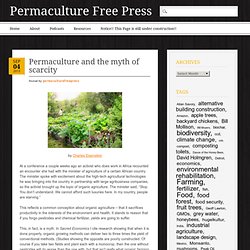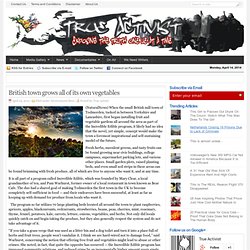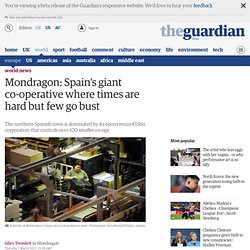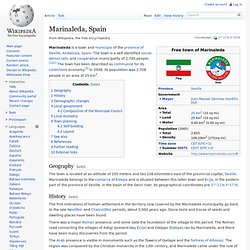

Permaculture and the myth of scarcity. By Charles Eisenstein At a conference a couple weeks ago an activist who does work in Africa recounted an encounter she had with the minister of agriculture of a certain African country.

The minister spoke with excitement about the high-tech agricultural technologies he was bringing into the country in partnership with large agribusiness companies, so the activist brought up the topic of organic agriculture. The minister said, “Stop. You don’t understand. We cannot afford such luxuries here. This reflects a common conception about organic agriculture – that it sacrifices productivity in the interests of the environment and health. This, in fact, is a myth. It turns out, though, that my statistics are way too conservative. When people project an imminent food crisis based on population growth or Peak Oil, they take for granted the agricultural methods we practice today. It is true that the old, control-based methods of agriculture are nearing the peak of their productive potential. British town grows all of its own vegetables.
(NaturalNews) When the small British mill town of Todmorden, tucked in between Yorkshire and Lancashire, first began installing fruit and vegetable gardens all around the area as part of the Incredible Edible program, it likely had no idea that the novel, yet simple, concept would make the town a foremost inspirational and self-sustaining model of the future.

Fresh herbs, succulent greens, and tasty fruits can be found growing near civic buildings, college campuses, supermarket parking lots, and various other places. Small garden plots, raised planting beds, and even small soil strips in these areas can be found brimming with fresh produce, all of which are free to anyone who want it, and at any time. Home : Park Slope Food Coop : Organic Food in Park Slope - Locally Grown Fruits and Vegetables, grass fed meats, organic cheese in Brooklyn, New York. Community Garden Checklist. If you're looking for an activity that people of all ages can enjoy, start a community garden.

Rallying support from your neighbors, friends or community-led organizations is a great way to start a garden in your back yard -- so to speak. Urban communities often find patches of land to host community gardens, and invite participants to help plant, harvest and enjoy the produce -- and in turn incorporate the necessary fruits, vegetables, vitamins and nutrients they need to stay healthy into their diets.
The USDA's People's Garden initiative offers lots of useful resources and a supportive network for both first-time planters and seasoned harvesters. Before you start a garden of your own, read and download this step-by-step guide, which offers important information about how to safely grow your own fruits and vegetables with others in your community: Engage Your Community Begin by bringing people and different organizations together to learn which issues are important to your community.
Københavns Fødevarefællesskab. Københavns Fødevarefællesskab (KBHFF) is a member-based and member-driven food co-operative in Copenhagen, Denmark.

KBHFF is an alternative to the ordinary profit-driven supermarket chains. We focus on offering organic and biodynamic products in season with lots of taste and quality at affordable prices. To us “consumer influence” is not just the opportunity to choose between different brands and groceries. In KBHFF, the customers are members, owners and co-workers.As a member you can buy cheap, locally produced organic fruit and vegetables every week.All members are expected to put in three hours of work in the Co-Op each month.
Find Locally Grown Food. Mondragon: Spain's giant co-operative where times are hard but few go bust. José María Ormaetxea is the co-founder of Spain's seventh biggest industrial group, but he potters around Mondragon in a Ford Fiesta and lives in an ordinary flat in this industrial town tucked into a valley in the country's northern Basque region.

"Imagine how rich he could have been if he had founded a different sort of company," said Kepa Oliden, a local newspaper reporter from this town of 23,000 people. "But you won't find anyone driving a Rolls-Royce in Mondragon. " Visitors also find little of the new poverty sweeping through other parts of Spain, for up the steep slopes of what locals jokingly call the "sacred mountain" lies the headquarters of the Mondragon Corporation, the remarkably recession-proof company that Ormaetxea helped found in 1956. There is little flashy about the offices of the Basque country's biggest industrial company, but then there is nothing normal about what is now the world's biggest workers co-operative … with global sales of €15bn (£13bn). Marinaleda, Spain. Geography[edit] The town is located at an altitude of 205 meters and lies 108 kilometers east of the provincial capital, Seville.

Marinaleda belongs to the comarca of Estepa and is situated between this latter town and Écija, in the eastern part of the province of Seville, in the basin of the Genil river. Its geographical coordinates are WikiMiniAtlas History[edit]